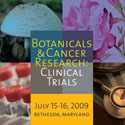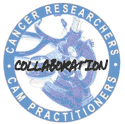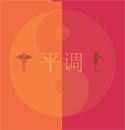Meetings and Events
Spring 2013
Vol. 8, Issue 1
Winter 2013
Vol. 7, Issue 2
Spring 2012
Vol. 7, Issue 1
Spring 2011
Vol. 6, Issue 1
Fall 2011
Vol. 6, Issue 2
Spring 2010
Vol. 5, Issue 1
Fall 2010
Vol. 5, Issue 2
Spring 2009
Vol. 4, Issue 1
Fall 2009
Vol. 4, Issue 2
Spring 2008
Vol. 3, Issue 1
Fall 2008
Vol. 3, Issue 2
Fall 2007
Vol. 2, Issue 2
Winter 2007
Vol. 2, Issue 1
Summer 2006
Vol. 1, Issue 2
OCCAM Conferences
2020
Virtual Meeting: International Perspectives on Integrative Medicine for Cancer Prevention and Cancer Patient Management
October 27-30, 2020
Overview
The main aims of the conference are: to 1) discuss the integration of traditional, complementary and alternative medicine (TCAM) with conventional cancer prevention and treatment approaches in global health, thus forming new approaches to integrative oncology, and 2) discuss approaches for strengthening Integrative Oncology research in low-and-middle-income-countries (LMICs).
View the workshop presenters and moderators
Videos
Day 1 – October 27, 2020
Day 2 – October 28, 2020
Day 3 – October 29, 2020
Day 4 – October 30, 2020
2019
Translating Fundamental Science of Acupuncture into Clinical Practice: — for Cancer Symptom Management, Pain and Substance Abuse
February 11-12, 2019
Lister Hill Center Auditorium, Building 38A
National Library of Medicine, NIH, Bethesda, Maryland
View February 11 Videocast
Total Running Time: 06:57:44
View February 12 Videocast
Total Running Time: 08:14:24
2016
Acupuncture For Cancer Symptom Management
June 16-17, 2016
Meeting Chairs: Farah Zia, MD
Oluwadamilola Olaku, MD, MPH, MRCOG
Overview
The Acupuncture for Cancer Symptom Management Conference is a seminal meeting that builds on two previous events.
In November 1997 The NIH office of Disease Prevention conducted a Consensus Development Conference focusing on acupuncture. The objective of the conference was to provide health care providers, patients, and the general public with a responsible assessment of the use and effectiveness of acupuncture for a variety of conditions.
Some of the conclusions of the conference stated that acupuncture as a therapeutic intervention is widely practiced in the United States. While there have been many studies of its potential usefulness, the results have been equivocal, due to design, sample size, and other factors. The issues are further complicated by inherent difficulties in the use of appropriate controls, such as placebos and sham acupuncture groups. However, some promising results have emerged from the many clinical trials. For example, efficacy of acupuncture has been demonstrated in the adult postoperative patient, chemotherapy induced nausea and vomiting, and in postoperative dental pain.
In November 2007, the Society for Acupuncture Research (SAR) hosted an international conference to mark the tenth anniversary of the landmark NIH Consensus Development Conference on Acupuncture. More than 300 acupuncture researchers, practitioners, students, funding agency personnel and health policy analysts from 20 countries attended. The SAR meeting was held at the University Of Maryland School Of Medicine, Baltimore, MD. The implicit goal of the conference was to foster closer ties among investigators active in this expanding field of research.
In building on the foundation laid by the 1997 Consensus Development Conference and the 2007 SAR conference, the objectives of NCI OCCAM's 2016 Acupuncture for Cancer Symptom Management Conference are:
- To determine the current evidence of acupuncture in the management of cancer patients
- To determine the symptom(s) with the best evidence of response to acupuncture treatment
- To determine the cost effectiveness of acupuncture treatment in the management of cancer patients
We aim to assess the current state of the science of acupuncture for cancer symptom management, determine the current gaps in research, and discuss ways to move research forward on a strong scientific foundation.
A white paper summary was published in a special edition monograph of the Journal of the National Cancer Institute (JNCI). The National Cancer Institute's Conference on Acupuncture for Symptom Management in Oncology: State of the Science, Evidence, and Research Gaps - PubMed (nih.gov)
2009
Botanicals and Cancer Research: Clinical Trials
July 15-16, 2009
Overview

Workshop activities were designed to assess the state-of-the-science of botanicals as potential cancer treatments, with a focus on anti-cancer drug development through clinical trials. Plenary sessions highlighted the various facets of botanical anti-cancer drugs research and prepared working groups for their discussion sessions. Results of these discussions will be summarized, presented to all of the workshop participants, and then written as manuscripts for publication in a cancer research journal.
2007
Cancer Researchers and CAM Practitioners: Fostering Collaborations; Advancing the Science Conference Series
October 22-23, 2007
Overview

The primary goals of this conference were to foster interaction and dialog between CAM practitioners and cancer researchers and to inform NCI staff about the issues related to the development, support, and implementation of research projects involving collaborations between CAM practitioners and cancer researchers.
View October 22 Videocast
Total Running Time: 07:15:40
View October 23 Videocast
Total Running Time: 01:22:40
2006
Traditional Chinese Medicine and Cancer Research: Fostering Collaborations; Advancing the Science Conference Series
April 10-12, 2006
Overview

The purpose of this conference was to inform NCI staff about the application of various Traditional Chinese Medicine modalities for cancer prevention, treatment, and symptom management and to facilitate discussion on the role that NCI should play in furthering research in this area.
View April 10 Videocast
Total Running Time: 06:13:56
View April 12 Videocast
Total Running Time: 03:20:03
Please Note: In order to view the videocasts, you must have RealPlayer installed on your computer. Download the latest version from the RealNetworks Web site.





